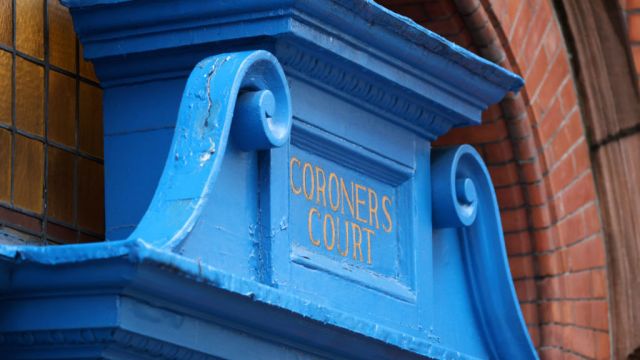A 59-year-old Dublin man who had played a competitive game of hurling for his GAA club a few months before his death suffered a fatal cardiac arrest a day after being discharged from hospital, an inquest has heard.
Raymond McKenna, a married father of two, was pronounced dead on July 2nd 2022, after collapsing on the previous evening at his family home on Killakee Avenue, Firhouse, Dublin.
An inquest into his death held at Dublin District Coroner’s Court on Thursday heard that his family remained puzzled as to why lung cancer could cause someone “to drop dead.”
Mr McKenna’s wife, Patricia O’Toole, told the hearing that she had tried to get her husband readmitted to Beacon Hospital in Sandyford at around 6.30pm on July 1, 2022 after he had vomited after taking medication to prevent blood clots.
Despite that he was discharged from the hospital around 24 hours earlier, Ms O’Toole said she was told readmission was not possible as the Beacon’s emergency department closed at 7pm and she was advised to ring 999 if his condition deteriorated.
Her husband was also offered an appointment at the hospital on the following day at 10.20am.
Evidence was heard that Mr McKenna had been admitted to the Beacon on June 24, 2022 where doctors had suspected lung cancer was responsible for the shortness of breath he had been experiencing.
He was discharged from the hospital on June 30th 2022 while he was awaiting a further test at a different medical facility to confirm the diagnosis.
The coroner, Clare Keane, returned a verdict of death by natural causes after hearing complex medical evidence about the case.
The results of a postmortem attributed the cause of death to lung cancer which had also spread to his lymph nodes and adrenal glands.
Deputy state pathologist, Yvonne McCartney, told the inquest it was “the burden” of the cancer which caused the fatal cardiac arrest.
While some blood clots were discovered in the body of the deceased, Dr McCartney did not regard them as a contributory factor in Mr McKenna’s death.
“There are multiple ways cancer like this can cause death,” the pathologist stated.
She confirmed that blood clots detected in the body of the deceased were only “microscopic.”
Ms O’Toole described her husband as “a strong, fit man” who had still been playing hurling at the age of 59 and working as a plasterer.
She told the coroner that he had lost about two stone in weight in June 2022 after complaining about a shortness of breath and a weakness in his legs.
Although he was very unwell, Ms O’Toole said her husband was “dying to get out of hospital,” particularly in time for his mother’s birthday.
She said cancer had been mentioned but never confirmed and he had been hoping that the problem might just be blood clots but understood there would be further follow-up care.
The inquest heard doctors had given Mr McKenna medication to take the day after his discharge to prevent blood clots.
However, Ms O’Toole said he started vomiting after taking the medicine when he was at home on June 30, 2022.
“He was very weak and incoherent,” she recalled.
“I could not understand why he was discharged when he was worse than when he went in,” she remarked.
Her daughter, Róisín, described attempting CPR after witnessing him collapse at the top of a stairs at home later that evening.
“He said he felt awful and weak,” she recalled.
A consultant in respiratory medicine at the Beacon, Abhilash Sahadevan, said the decision to discharge the patient was mostly guided by the fact that Mr McKenna “wanted to go home and was well enough.”
Dr Sahadevan said Mr McKenna knew there was a chance he had metastatic lung cancer but that there was a need for diagnosis “to guide treatment going forward.”
“He was medically fit for discharge,” the consultant stressed.
Dr Sahadevan said he had no immediate concerns about the patient but had given him anticoagulants to counter “very small” blood clots that had been detected in his body.
Although Mr McKenna had no large tumours, the consultant said his biggest concern remained the burden of the suspected lung cancer on the patient.
He told the coroner that he did not believe the outcome would have been any different if Mr McKenna had not been discharged from the hospital.
Cross-examined by counsel for Mr McKenna’s family, Doireann O’Mahony BL, Dr Sahadevan said the deceased had made clear his preference to go home while waiting to have the further test to confirm if he had lung cancer.
Ms O’Mahony said the deceased was a GAA star who was “taken far too soon.”
A member of Round Tower and Ballyboden St Enda’s GAA clubs, Mr McKenna had played in an Over 35’s hurling tournament in the Easter before his death and planned to play junior championship for one more year
“He was a leading light in his family and community. His legacy will live on forever,” she added.
Counsel for Dr Sahadevan, Rory White BL, said it was clear from the evidence that Mr McKenna’s body was compromised by his cancer which had led to a cardiac arrest in what was “a sad and tragic death.”
Returning a verdict of death due to natural causes, Dr Keane said her findings were based on facts established at the hearing, and she expressed hope that most of his family’s questions had been answered.
The coroner said Mr McKenna had been “clinically stable” at the time of his discharge from the Beacon and pointed out that he had agreed to a plan about his discharge and follow-up care.
Speaking after the inquest, Ms O’Toole said she was still struggling to make sense of how lung cancer could cause her husband’s sudden death.
“I find it hard to understand how you can die from lung cancer so quickly,” she remarked.







